
Vultures
Vital to Bush Health
Vultures play a vital role in the bush – they clean up dead and decaying carcasses and thereby remove centres of disease.
Lappet-face Vulture Walking towards a carcass.
They are often cast as motley, evil birds by the media but vultures have an array of marvellous adaptations that suit them perfectly to their ‘job description’. Vultures lack feathers on their heads and necks. This is because they are inclined to insert these parts of their bodies directly into carcasses and if they were covered in feathers, these would easily become soiled.
Soiled head feathers are a ‘health hazard’ and could cause infection or illness. Furthermore, preening these areas would prove difficult. Vultures are in fact very clean birds and most species will bathe regularly to rid themselves of unsanitary debris.
By Megan Emmett
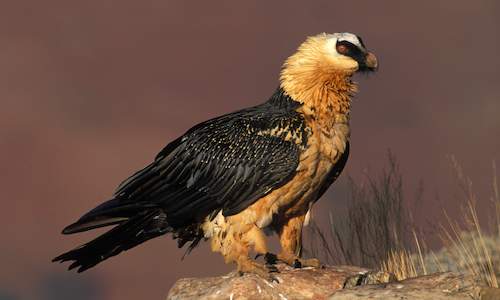
The bearded vulture will hunt live prey, specialising in tortoises, with the tortoises being dropped from a height, the same as the bones, t...
more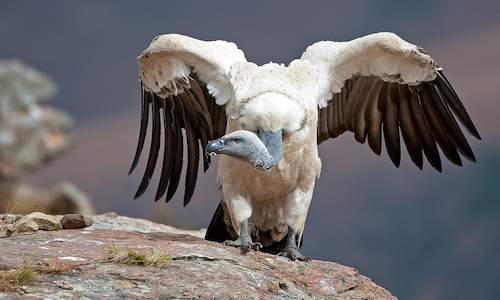
The Cape vulture is the heaviest of the Southern African vultures weighing in at up to 9 kgs and is mostly creamy dark brown in colour, with...
more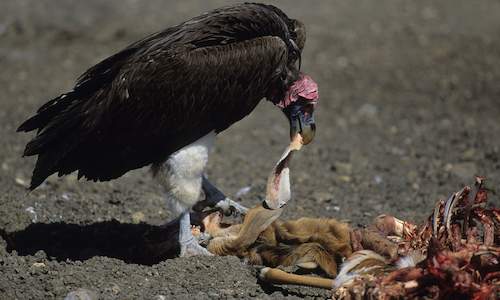
The lappet-faced vulture will tackle parts of the carcass that is too tough for other breeds of vultures, like the skin, tendons and ligamen...
more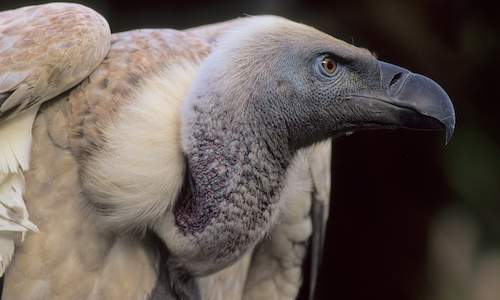
Because of their naked heads and necks, vultures need to have a mechanism to control their temperature as heat exchanges easier through nake...
more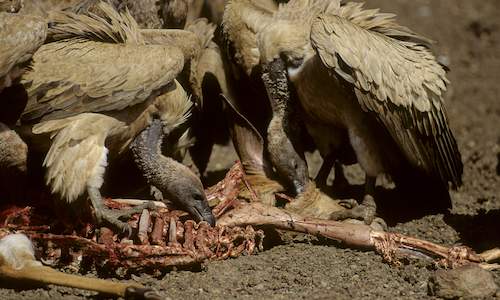
The white-backed vultures are the most numerous and are frantic, noisy feeders hissing and mobbing one another to get their share of the spo...
more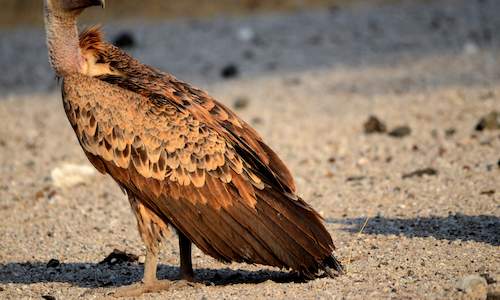
White-backed vultures are aggressive feeders and will push other animals, that are smaller than itself, away from a carcass....
more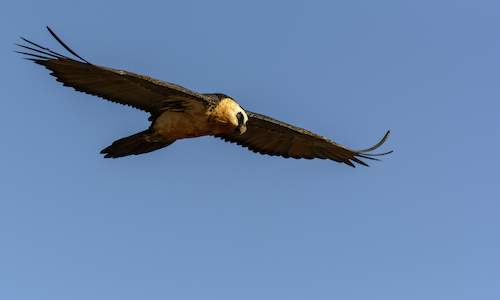
Vultures use thermals to gain a height vantage to look for food and by moving from one thermal to the next they can survey vast areas while ...
more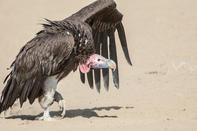
 The bearded vulture will hunt live prey, specialising in tortoises, with the tortoises being dropped from a height, the same as the bones, t...
The bearded vulture will hunt live prey, specialising in tortoises, with the tortoises being dropped from a height, the same as the bones, t... The Cape vulture is the heaviest of the Southern African vultures weighing in at up to 9 kgs and is mostly creamy dark brown in colour, with...
The Cape vulture is the heaviest of the Southern African vultures weighing in at up to 9 kgs and is mostly creamy dark brown in colour, with... The lappet-faced vulture will tackle parts of the carcass that is too tough for other breeds of vultures, like the skin, tendons and ligamen...
The lappet-faced vulture will tackle parts of the carcass that is too tough for other breeds of vultures, like the skin, tendons and ligamen... Because of their naked heads and necks, vultures need to have a mechanism to control their temperature as heat exchanges easier through nake...
Because of their naked heads and necks, vultures need to have a mechanism to control their temperature as heat exchanges easier through nake... The white-backed vultures are the most numerous and are frantic, noisy feeders hissing and mobbing one another to get their share of the spo...
The white-backed vultures are the most numerous and are frantic, noisy feeders hissing and mobbing one another to get their share of the spo... White-backed vultures are aggressive feeders and will push other animals, that are smaller than itself, away from a carcass....
White-backed vultures are aggressive feeders and will push other animals, that are smaller than itself, away from a carcass.... Vultures use thermals to gain a height vantage to look for food and by moving from one thermal to the next they can survey vast areas while ...
Vultures use thermals to gain a height vantage to look for food and by moving from one thermal to the next they can survey vast areas while ...